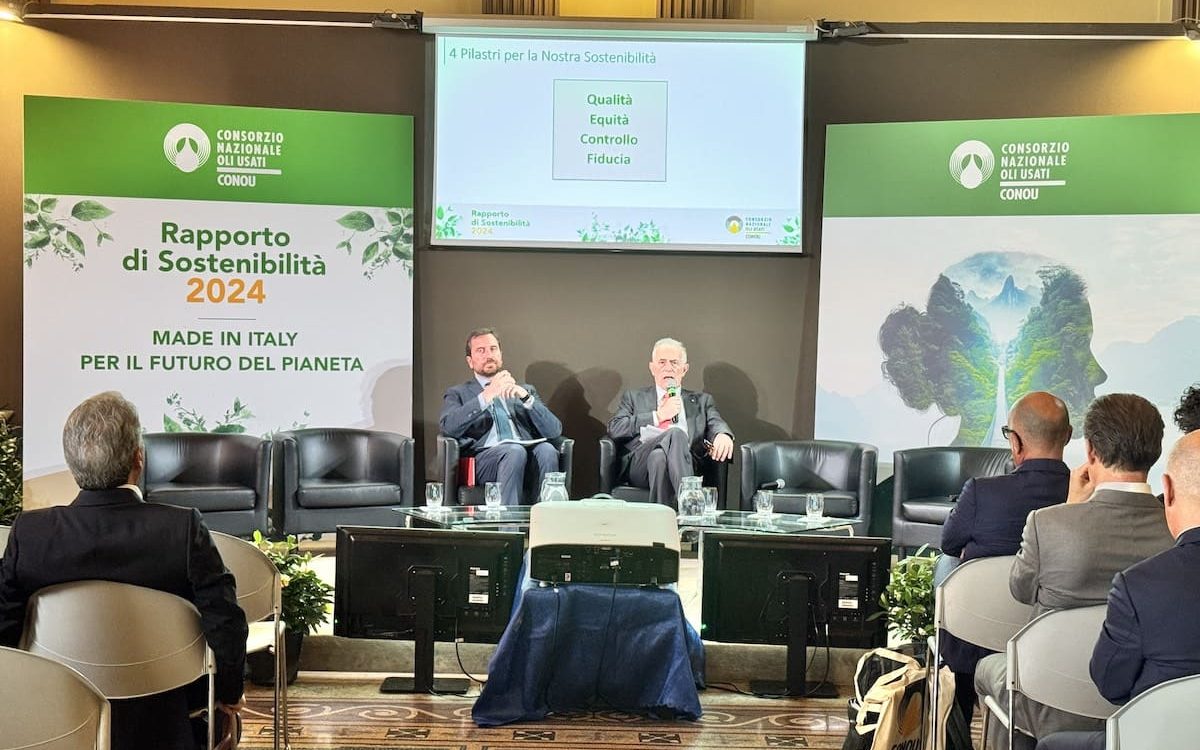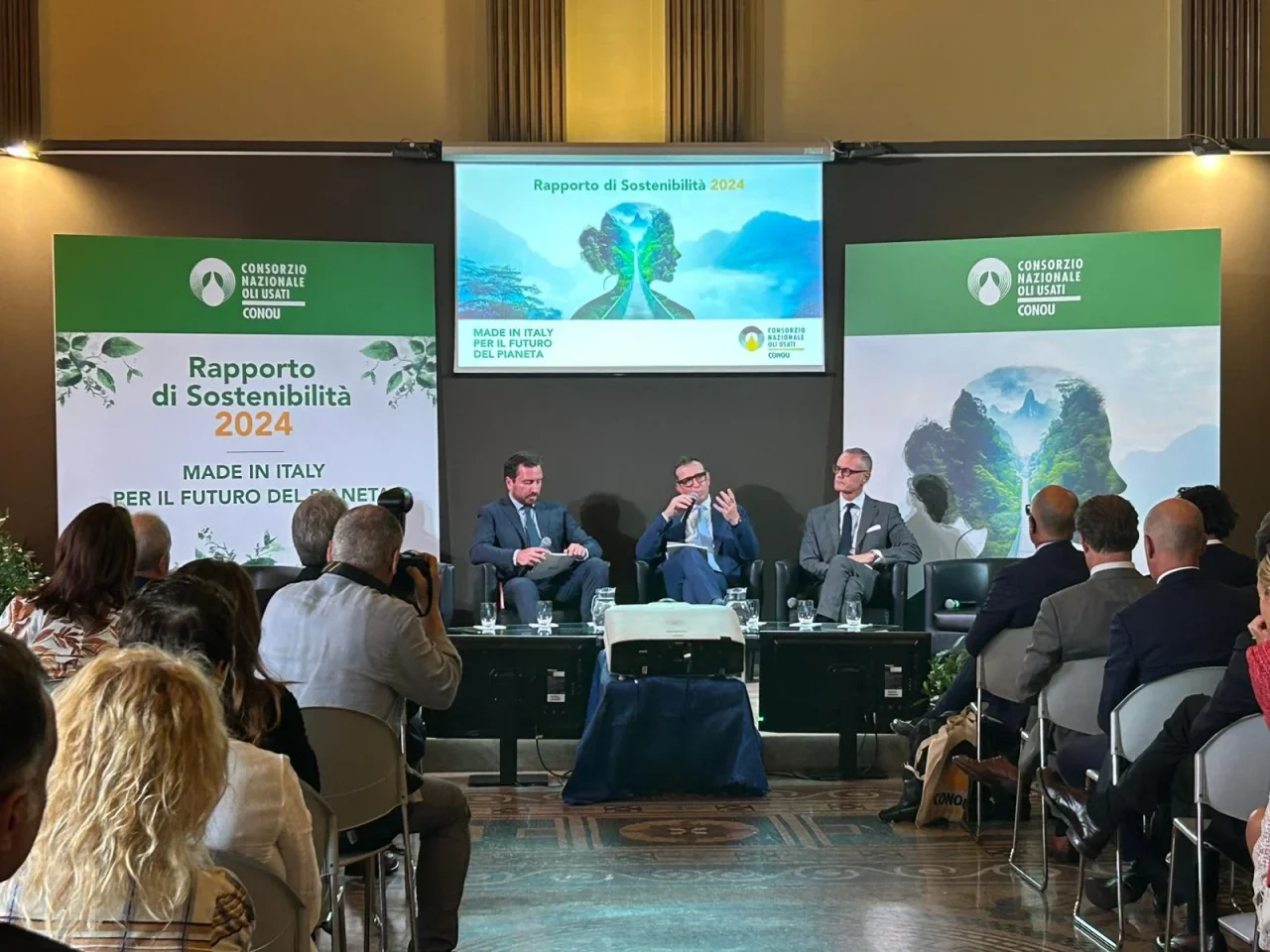
CONOU presents its 2024 Sustainability Report in Rome
The new 2024 Sustainability Report reaffirms CONOU’s role, the Italian National Consortium for the Management of Used Mineral Oils, as a European benchmark in the circular economy. Released at Palazzo Wedekind in Rome, the data confirms Italy’s consortia-based system as a model for the sustainable management of used oils across the continent.
In a challenging year marked by a general decline in lubricants placed on the market, the Consortium succeeded in increasing the amount of oil collected, reaching 188,000 tons, a 3% rise from 2023, covering nearly all recoverable oil nationwide. Over 98% of this was sent for regeneration, turning it into new base lubricants with properties equivalent to the original product. This activity generated major environmental benefits, including more than 90,000 tons of CO₂ equivalent avoided and approximately 49 million cubic meters of water saved.
During his opening remarks, CONOU President Riccardo Piunti emphasized that sustainability is not just a mission statement, but a guiding principle in all daily operations across the supply chain:
“Sustainability is a bridge between generations, but every bridge needs solid pillars. Ours are quality, equity, control, and trust. Without them, nothing lasting can be built.”
These four pillars frame the entire report and defines the Consortium’s long-term strategy.
CONOU’s model: a benchmark in circular economy
For over 40 years, the Consortium has ensured the safe, efficient, and sustainable management of used mineral oils. Its consistent performance has made it a key player in the national industrial system and a recognized example of circular economy success at the European level. Its strength lies in a governance model based on traceability and transparency, combined with tangible environmental, social, and economic impact.
Speaking during a roundtable, Gianni Murano, President of Unem, highlighted the industrial value of CONOU’s operations:
“CONOU has become a model capable of combining environmental efficiency and economic development. We should extend this approach to other industrial sectors as well, for example by converting fuel stations into hubs for sustainable mobility, using technologies such as waste-based biofuels.”
The Sustainability Report 2024 confirms that the Consortium’s impact goes beyond reducing environmental damage. It actively improves the country’s energy balance while enhancing existing infrastructure.
Quality at the core of the supply chain
Quality is the first strategic pillar guiding CONOU’s operations, rooted in a deep commitment to circular economy principles.
The CONOU system is built on two tightly integrated processes: widespread collection of used mineral oils and their regeneration.
Quality is not limited to the end product but permeates every stage of the chain, from initial collection and proper handling to the technological excellence of the regeneration plants.
To ensure successful regeneration, used mineral oil must be properly managed from the source. For this reason, CONOU runs awareness campaigns targeting industrial and artisan sectors, aiming to raise understanding and reduce reliance in the input stream.
This is not simply waste management, it’s resource transformation.
Unlike combustion, which destroys the material to produce energy, regeneration recovers the substance and extends its life cycle. In 2024, this process yielded over 121,000 tons of regenerated base lubricants, reducing Italy’s dependence on crude oil imports.
Environmental law expert Leonardo Salvemini noted: “The Consortium was created to make a difference. It operates with public interest in mind, despite being a private entity. Today, it stands as a regulatory and technical best practice. With the new 2025–2027 Supply Chain Agreement, the goal is to reward those who meet higher quality standards, introduce environmental taxation criteria, and promote extended producer responsibility.”
The Report highlights that adopting these principles is essential to increasing regeneration efficiency and further lowering environmental impact.
Equity, sustainability, and future generations
Equity is the second pillar, with a strong focus on gender equality. In 2024, CONOU earned the PDR 125 certification, confirming its commitment to increasing women’s participation in technical and leadership roles throughout the supply chain. This milestone reflects its effort to challenge gender stereotypes that still hinder women’s access to education and careers in the environmental and industrial sectors.
The Consortium is actively working to foster an inclusive work environment, embracing diversity and supporting female engagement across all areas of its operations.
Alongside gender equity, the report also highlights how younger generations view sustainability, underlining the need to involve youth in building a fairer and more responsible future.
Pierluigi Zerbino, senior researcher in Circular Economy and Digital Innovation at the University of Pisa, emphasized CONOU’s educational role:
“To young people, circular economy often feels abstract or disempowering. But initiatives like those led by CONOU prove that there are real, replicable models that offer hope and meaningful job opportunities.”
The Report states that over 1,850 professionals work across the supply chain, with roles ranging from logistics to plant operations, supporting a wide range of career paths.

Control, traceability, and transparency
Control is the third strategic pillar and is key to the system’s reliability.
In 2024, CONOU made significant progress on this front. Most notably, the fight against environmental Contribution evasion moved in the right direction. While not completely eradicated, the issue is now considered fully under control.
Control also means full traceability and transparency throughout the supply chain, from collection to regeneration. Every liter of used oil is tracked via an advanced digital system that allows for real-time monitoring of flows and facilities involved. This enhances performance and provides a robust defense against fraud and environmental crimes.
Governance and local impact
Trust is the fourth pillar. Trust in the quality and completeness of the collection system, in the flexibility and efficiency of regeneration processes, and in the responsible use of funds provided by producers. This trust is built on a transparent, inclusive, and representative governance model.
The 2024 Report also underscores CONOU’s local engagement: 58 collection companies serve the entire national network, covering 103,000 waste generation sites and traveling a total of 25.1 million kilometers in one year.
In his remarks, Legambiente President Stefano Ciafani stressed the importance of investing in such models to revitalize disused industrial areas: “If we used resources to remediate and regenerate compromised areas, we could give new momentum to sustainable development. CONOU proves that waste can be transformed into value.”
A message aligned with the ongoing efforts in monitoring, research, and continuous improvement documented in the report.
CONOU: an Italian model for Europe
Finally, the 2024 Sustainability Report reflects on the international landscape. Italy is now a European leader in used mineral oil management, with a regeneration rate exceeding 98%. The report argues that this consortia-based model could be adapted and replicated in other countries, in accordance with local regulations. CONOU’s presence at international events, partnerships with trade associations, and adoption of advanced tools, such as life cycle assessment (LCA) in its reporting, reinforce its role as a key player in Europe’s sustainability transition.
“Europe should look to this example,” said Ciafani. “Our system shows that environmental sustainability, economic value, and social responsibility can go hand in hand. But we need a European industrial policy that supports and promotes these models.”
The Report concludes with a series of recommendations to strengthen public-private collaboration, improve environmental taxation policies, and incentivize innovation across the supply chain.
With the Sustainability Report 2024, CONOU once again proves to be a benchmark for those who believe that circular economy is a real driver of growth, cohesion, and competitiveness.